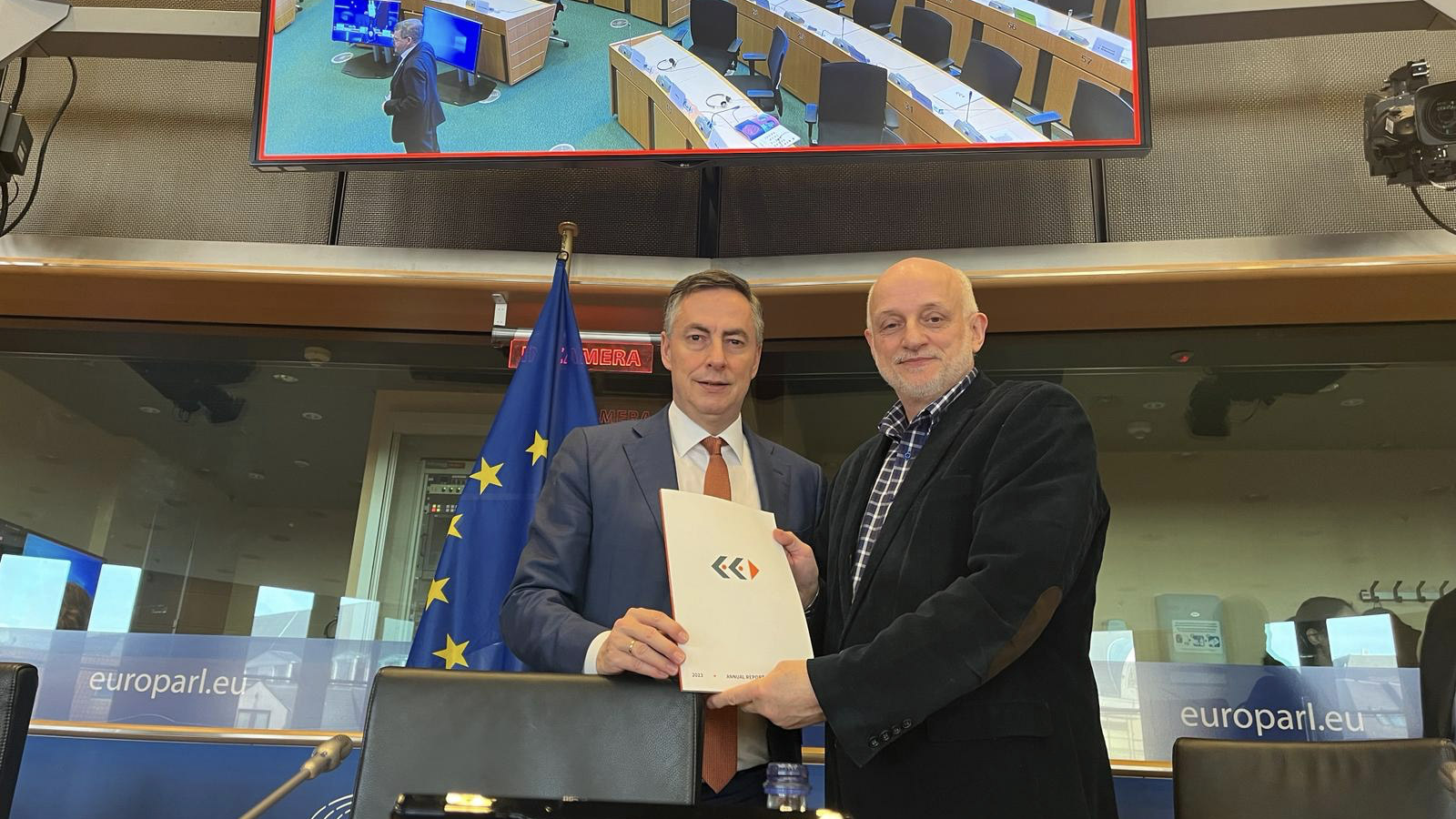
This week, EED’s Executive Director Jerzy Pomianowski launched EED's 2023 Annual Report at the Committee on Foreign Affairs in the European Parliament.
David McAllister, Chair of the AFET Committee and Chair of EED’s Board of Governors welcomed Jerzy Pomianowski to the Parliament, He stated that in today’s difficult geopolitical climate, EED’s mission to provide flexible democracy support is more relevant that ever.
Pomianowski noted that in 2023, EED celebrated its tenth anniversary and reached the milestone of €200 million in grant support provided to independent media and civil society across the European Neighbourhood and beyond. In total, we have provided nearly 2,500 grants since 2013.
He stated that EED was set up to provide flexible support to democracy activists, complementing other EU and Member State democracy support programmes. At this challenging time, with war raging on our borders and 'hybrid' interference in democracies worldwide, he underlined his firm believe that EED must play a central role in supporting democracy.
He noted the importance of continued solidarity and support to democracy activists in the Middle East, North Africa (MENA) and in Palestine in particular. These are moderate voices who believe in democratic futures for their countries.
Referring to Russia, he noted that the presence of thousands of brave citizens at Alexei Navalny's funeral earlier this month is evidence that civil society continues to be present and alive.
Speaking of Ukraine, he emphasised that two years into the full-scale Russian invasion and now an EU Accession country, Ukraine needs far more than war heroes. As noted at a recent event in EED’s offices by EED’s partners, Ukraine's soldiers and their families need a future in a democratic society that is underpinned by the rule of law.
Civil society must be central to the recovery plan. EED is working with civil society and independent media throughout the country. Partners such as the Human Rights Center Pryncyp, working with soldiers and veterans, and Smyilyi Irpin, and Vilne Radio, all featured in this year's Annual Report, are doing vital work.
He related that throughout EED's 10th anniversary year he had stressed the intrinsic link between democracy and security, and this was set out clearly in EED’s Strategic Orientation Document that set out its vision for the next decade.
He emphasised that Belarus’s democratisation is as vital as Ukraine’s victory, noting that the EU has a moral obligation to continue to support Belarus' exiled leaders, its brave activists and independent media.
Pomianowski emphasised the importance of supporting democracy activists within the wider EU Neighbourhood, where there is a worrying decline in democracy.
He referred to a decline in the operational environment for civil society and independent media in Georgia, while the political discourse is focused on the country's EU future. Civil society organisations, including EED’s partners, have come under attack. Yet a vibrant civil society and free media are the cornerstone of Georgia' success in the accession process.
He also mentioned Moldova, another accession country, where the Kremlin is continuing to compromise the democratic process in an effort to keep the country under its sphere of influence. Independent media actors, such as EED's partner TV8 are essential to counter disinformation and are crucial members of the free media landscape.
He spoke of the vital support EED is providing to independent media in Serbia, thanks in part to earmarked funding from the EU Delegation, in a context of decreased media freedom, hate speech and intimidation. Organisations such as A1 net in southwest Serbia provide vital reliable news reporting.
Pomianowski also highlighted that conflicts and insecurity always start with words, narratives and emotions. Dictators and autocrats care about the mindsets of their populations. This is as relevant today in our region, as it is in the global South and MENA region. He noted how important it is to support moderate voices, such as EED's partners in the Arab world, who combat misinformation, ensure accurate reporting and raise awareness of violations of human rights and advocating for justice and accountability.
Finally, less than three months before European Parliament elections, Jerzy Pomianowski referring to the EU democracy support community made a call to the EU not to compromise on democracy. Democracy should be part of security, migration, energy and trade agendas. That way we can demonstrate our respect to the brave activists who are fighting for democracy in their countries and who continue to believe in safer better lives.
Several MEPs spoke up in support of EED’s work.
Michael Gahler MEP noted the importance of parallel discussions on democracy in contexts like Tunisia and Egypt, when negotiating issues such as migration. He also spoke of the importance of encouraging collaboration between different civil society organisations and groups, particularly in Belarus and Ukraine.
Isobel Santos MEP supported Pomianowski in his statement about the intrinsic linkages between democracy and security.
Bernard Guetta MEP, and member of EED’s Board of Governors and Executive Committee, stated that many brave activists in the Neighbourhood know the EU thanks to EED’s work. He commended EED for the hugely valuable knowledge and of democracy movements and of the key democracy actors in Neighbourhood countries.
Hannah Neumann MEP noted the importance of EED for the EU and asked about the potential role for EED working with Iranian democracy activists.
This 2023 Annual report provides a snapshot of the work our partners throughout the European Neighbourhood and beyond are doing to support democracy in their different contexts: in anti-corruption, independent media, civic activism, human rights activism, women's empowerment, LGBTQI+ rights, youth and cultural activities. It includes Special Sections focused on the work of Women-led Initiatives in Ukraine and on Civil Society and Independent Media in Humanitarian Crises: The Turkey-Syria Earthquake.